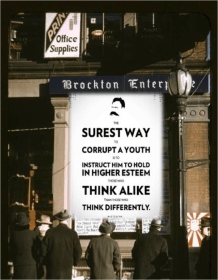The coal industry’s misleading attempts to brand itself as a poverty fighter continue to unravel, with a new report from Oxfam demonstrating that renewable energy is the easiest, cheapest, and most effective method to give people life-changing energy access. The Powering Up Against Poverty report shows that given its heavy health and climate impacts, coal is an ill-conceived solution to bring power to one billion people around the world and, as 84 per cent of the energy poor live in rural areas, the cost of extending electricity grids to those rural areas is prohibitively expensive. Oxfam has also warned the Australian Government – which has been aggressively parroting coal industry rhetoric – that it is time to end its love affair with coal, as it’s risking not only the global climate, but its economic and political future, given the growing emphasis on renewable energy in China, India, Africa and major economies like the US.
Renewables are the best and only choice to address energy poverty in the developing world. Oxfam notes that four out of five people without electricity live in rural areas that are often not connected to a centralised energy grid. Renewable energy solutions offer them a much more affordable, practical and healthy solution than coal. Coal’s so-called ability to lift them out of poverty is a PR exercise, as the health, climate, and economic consequences that come with coal do far more harm than good. Fossil fuels cost society US$105-$122 per tonne of carbon dioxide – two to nine times their total revenue – according to a University of Cambridge study. Companies like Peabody Energy have a net negative economic contribution to society and, as this becomes clearer, it is little wonder why the transition to clean, renewable energy is picking up steam faster than many imagined.
Climate change is hitting poor communities first and hardest, and coal is the biggest single contribution to climate change.Addressing climate change and reducing poverty go hand in hand. From an energy access point of view, renewables offer the cheapest, fastest, and healthiest way to increase energy access, which is why the world is shifting from fossil fuels to renewable energy faster than most had predicted. With its heavy environmental, health and economic impacts, coal is a major threat in the fight against hunger and poverty.
Coal is not “good for humanity”, and it’s not even good for coal companies. The changing energy landscape globally has seen coal giant Peabody Energy’s stock price sink like a stone. The company has lost just over a billion US dollars in three months, making it one of the world’s most high-profile examples of the ongoing death of fossil fuels. It may think that it can save its skin by rebranding itself as a poverty fighter but, as Oxfam notes: coal companies make heavy indirect contributions to climate change and the floods, drought, cyclones and changes to food patterns it brings. They also contribute directly through air pollution problems and displacement of communities as coal mines force them off their land, leaving them with poor access to food and water and struggling to make a living. Simply put, coal companies have no moral argument for poverty alleviation.




































